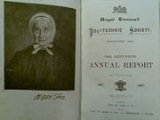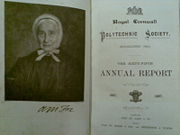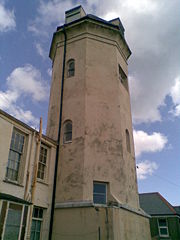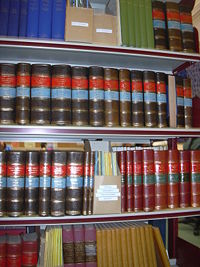
Royal Cornwall Polytechnic Society
Encyclopedia
The Royal Cornwall Polytechnic Society is an educational, cultural and scientific charity, based in Falmouth
, Cornwall
, England
, United Kingdom
. The Society exists to promote innovation in the arts and sciences. Its trading subsidiary ran "The Poly", a local arts and cinema venue until going into administration in January 2010.
 In 1832 the Fox family
In 1832 the Fox family
.
a prominent Quaker business family of Falmouth
, founded the Cornwall Polytechnic Society, to promote the ideas and inventions of the workers in their Perran Foundry. This was the first use of the word ‘Polytechnic
’ (meaning “of many arts and techniques”) in Britain
.
In 1835 King William IV bestowed Royal Patronage on the Society, at the request of Davies Gilbert
and it changed its name from the Cornwall Polytechnic Society to the Royal Cornwall Polytechnic Society..
In the same year the Polytechnic Hall was built, at 24 Church Street, Falmouth, being originally used for “objects connected with the sciences, arts and literature”, but not for theatrical purposes. This restriction was removed in 1889 to permit “dramatic plays”. The building was designed by George Wightwick
.
 By 1837, the Society had local Committees in Falmouth & Penryn, Truro, Redruth, Camborne, St. Day & Chacewater, Helston, Penzance & Marazion, Hayle, St. Austell & Fowey, Liskeard and Bodmin, as well as a Ladies Committee. In all, there were 98 committee members.
By 1837, the Society had local Committees in Falmouth & Penryn, Truro, Redruth, Camborne, St. Day & Chacewater, Helston, Penzance & Marazion, Hayle, St. Austell & Fowey, Liskeard and Bodmin, as well as a Ladies Committee. In all, there were 98 committee members.
The Society played a prominent role in industrial development in the 19th century, being instrumental in the development of the “Man engine
” in mines also improved drilling machinery, mine ventilation, the health and welfare of fishermen and miner
s – and explosives. In 1865 the Hall was damaged by a demonstration of Nobel
’s gun cotton and nitro-glycerine.
In 1858 the Society founded The Miners Association
to better aid the mining industry.
The first Secretary to the Poly was Thomas Brown Jordan
.
In 1840, Jordan was succeeded as Secretary by Robert Hunt
, who both organised the programme of Exhibitions and Lectures and gave fascinating lectures himself.
The Society benefitted from the availability of "star" scientific and technical speakers in its Lecture Programmes, thanks to the network of friends of Robert Were Fox
, F.R.S. and his brother Charles Fox. The presentation of the cutting edge of scientific knowledge resulted in large and enthusiastic audiences.
The Society has had many notable Presidents including the novelist Howard Spring
who lived in Falmouth from 1947 to 1965 and served for eight years.
At its AGM on 3 October 2006, the Society decided to both value the past but to live in the future. It adopted the Board's plan to shift the "brand" from "Falmouth Arts Centre" to "The Poly". Members agreed to divide the organisation's operations into two with a charitable body and a trading wing, both providing high quality services. The meeting accepted the new Memorandum of Association, approved by the Charity Commission.
The ""Poly" is the most southerly venue in the UK of the Café Scientifique
movement, running events at Falmouth and St Ives
.
During 2008, the Society will celebrate its 175th anniversary with a series of events and announcements. Emulating 19th Century awards for technology projects, it will also offer the first of a planned biennial prize to encourage innovation in some area of art and science. To be called "the Fox Award", in honour of the founders of the Society, the details of the inaugural prize was announced. In September, there was be an exhibition on the History of the Society.
In January 2010, the trading company which ran the Poly cinema programme went into administration.

Falmouth, Cornwall
Falmouth is a town, civil parish and port on the River Fal on the south coast of Cornwall, England, United Kingdom. It has a total resident population of 21,635.Falmouth is the terminus of the A39, which begins some 200 miles away in Bath, Somerset....
, Cornwall
Cornwall
Cornwall is a unitary authority and ceremonial county of England, within the United Kingdom. It is bordered to the north and west by the Celtic Sea, to the south by the English Channel, and to the east by the county of Devon, over the River Tamar. Cornwall has a population of , and covers an area of...
, England
England
England is a country that is part of the United Kingdom. It shares land borders with Scotland to the north and Wales to the west; the Irish Sea is to the north west, the Celtic Sea to the south west, with the North Sea to the east and the English Channel to the south separating it from continental...
, United Kingdom
United Kingdom
The United Kingdom of Great Britain and Northern IrelandIn the United Kingdom and Dependencies, other languages have been officially recognised as legitimate autochthonous languages under the European Charter for Regional or Minority Languages...
. The Society exists to promote innovation in the arts and sciences. Its trading subsidiary ran "The Poly", a local arts and cinema venue until going into administration in January 2010.
History

Fox family of Falmouth
The Fox family of Falmouth, Cornwall, UK were very influential in the development of the town of Falmouth in the 19th century and of the Cornish Industrial Revolution...
.
a prominent Quaker business family of Falmouth
Falmouth, Cornwall
Falmouth is a town, civil parish and port on the River Fal on the south coast of Cornwall, England, United Kingdom. It has a total resident population of 21,635.Falmouth is the terminus of the A39, which begins some 200 miles away in Bath, Somerset....
, founded the Cornwall Polytechnic Society, to promote the ideas and inventions of the workers in their Perran Foundry. This was the first use of the word ‘Polytechnic
Polytechnic (United Kingdom)
A polytechnic was a type of tertiary education teaching institution in England, Wales, and Northern Ireland. After the passage of the Further and Higher Education Act 1992 they became universities which meant they could award their own degrees. The comparable institutions in Scotland were...
’ (meaning “of many arts and techniques”) in Britain
United Kingdom of Great Britain and Ireland
The United Kingdom of Great Britain and Ireland was the formal name of the United Kingdom during the period when what is now the Republic of Ireland formed a part of it....
.
In 1835 King William IV bestowed Royal Patronage on the Society, at the request of Davies Gilbert
Davies Gilbert
Davies Gilbert FRS was a British engineer, author, and politician. He was elected to the Royal Society on 17 November 1791 and served as President of the Royal Society from 1827 to 1830....
and it changed its name from the Cornwall Polytechnic Society to the Royal Cornwall Polytechnic Society..
In the same year the Polytechnic Hall was built, at 24 Church Street, Falmouth, being originally used for “objects connected with the sciences, arts and literature”, but not for theatrical purposes. This restriction was removed in 1889 to permit “dramatic plays”. The building was designed by George Wightwick
George Wightwick
George Wightwick was an architect and possibly the first architectural journalist.In addition to his architectural practice, he developed his skills and the market for architectural journalism...
.

The Society played a prominent role in industrial development in the 19th century, being instrumental in the development of the “Man engine
Man engine
A man engine is a mechanism of reciprocating ladders and stationary platforms installed in mines to assist the miners’ journeys to and from the working levels...
” in mines also improved drilling machinery, mine ventilation, the health and welfare of fishermen and miner
Miner
A miner is a person whose work or business is to extract ore or minerals from the earth. Mining is one of the most dangerous trades in the world. In some countries miners lack social guarantees and in case of injury may be left to cope without assistance....
s – and explosives. In 1865 the Hall was damaged by a demonstration of Nobel
Alfred Nobel
Alfred Bernhard Nobel was a Swedish chemist, engineer, innovator, and armaments manufacturer. He is the inventor of dynamite. Nobel also owned Bofors, which he had redirected from its previous role as primarily an iron and steel producer to a major manufacturer of cannon and other armaments...
’s gun cotton and nitro-glycerine.
In 1858 the Society founded The Miners Association
The Miners Association
The Miners Association was founded in 1858 by Robert Hunt FRS, and the Royal Cornwall Polytechnic Society.The Association was formed to create a body that would discuss, develop, address the needs and represent the hard rock mining industry within the south west region of the United...
to better aid the mining industry.
The first Secretary to the Poly was Thomas Brown Jordan
Thomas Brown Jordan
-Birth and beginnings:Born at Bristol on 24 October 1807, he was the son of Thomas Jordan , and began life as an artist.-Move to Cornwall:When barely twenty he moved to Falmouth...
.
In 1840, Jordan was succeeded as Secretary by Robert Hunt
Robert Hunt (scientist)
Robert Hunt , a scientist and antiquarian, was born at Devonport, Plymouth, in the United Kingdom. He was involved in statistical, mineralogical and other studies. He died in London on 17 October 1887.-Early life:...
, who both organised the programme of Exhibitions and Lectures and gave fascinating lectures himself.
The Society benefitted from the availability of "star" scientific and technical speakers in its Lecture Programmes, thanks to the network of friends of Robert Were Fox
Robert Were Fox the Younger
Robert Were Fox FRS was a British geologist, natural philosopher and inventor. He is known mainly for his work on the temperature of the earth and his construction of a compass to measure magnetic dip at sea....
, F.R.S. and his brother Charles Fox. The presentation of the cutting edge of scientific knowledge resulted in large and enthusiastic audiences.
The Society has had many notable Presidents including the novelist Howard Spring
Howard Spring
Howard Spring was a Welsh author.He began his writing career as a journalist, but from 1934 produced a series of best-selling novels, the most successful of which was Fame is the Spur , which has been both a major film, starring Michael Redgrave, and a BBC television series , starring Tim...
who lived in Falmouth from 1947 to 1965 and served for eight years.
Notable people
Notable members and others associated with the Poly include:- Jonathan CouchJonathan CouchJonathan Couch was a British naturalist, the only child of Richard and Philippa Couch, of a family long resident at Polperro, a small fishing village between Looe and Fowey, on the south coast of Cornwall.-Biography:...
, (1789–1870), physician and naturalist. - Thomas Brown JordanThomas Brown Jordan-Birth and beginnings:Born at Bristol on 24 October 1807, he was the son of Thomas Jordan , and began life as an artist.-Move to Cornwall:When barely twenty he moved to Falmouth...
, (1807–1890), engineer. - Henry LethebyHenry LethebyHenry Letheby , analytical chemist and public health officer, was born at Plymouth in 1816, and studied chemistry at the Royal Cornwall Polytechnic Society. In 1837 he commenced the study of medicine, and became the assistant of Jonathan Pereira. He graduated M.B...
, (1816–1876), analytical chemist and public health engineer. - Matthew Paul MoyleMatthew Paul MoyleMatthew Paul Moyle , meteorologist and writer on mining, second son of John Moyle, by Julia, daughter of Jonathan Hornblower, was born at Chacewater, Cornwall, 4 October 1788, and educated at Guy's and St...
, (1788–1880), surgeon and geologist. - John Eastman Palmer, 19th century photographer
- John Arthur PhillipsJohn Arthur PhillipsJohn Arthur Phillips was a British geologist. He was born at Polgooth, near St Austell in Cornwall the son of John Phillips, who at one time was occupied as a mineral agent, and of Prudence Gaved of Tregian, St Ewe....
, (1822–1887), mining engineer and metallurgist. - Walter Hawken TregellasWalter Hawken TregellasWalter Hawken Tregellas , miscellaneous writer, born at Truro, Cornwall, UK on 10 July 1831, was a professional draughtsman and writer of historical, biographical and other works.-Life and writings:...
, (1831–1894), writer.
21st Century developments
In 2000 the Society merged with Falmouth Arts. The Society, following this merger, decided to adopt the trading name of Falmouth Arts Centre and this has now become the name of the Polytechnic Hall. Today the building regularly shows the work of art students as well as the screening of films in its cinema.At its AGM on 3 October 2006, the Society decided to both value the past but to live in the future. It adopted the Board's plan to shift the "brand" from "Falmouth Arts Centre" to "The Poly". Members agreed to divide the organisation's operations into two with a charitable body and a trading wing, both providing high quality services. The meeting accepted the new Memorandum of Association, approved by the Charity Commission.
The ""Poly" is the most southerly venue in the UK of the Café Scientifique
Café Scientifique
Café Scientifique is a grassroots public science initiative currently running in 42 cities across the United Kingdom and cities in other countries. At least twelve cafés outside the UK are organised by the British Council alone. Similar but independent events have also sprung up in many cities...
movement, running events at Falmouth and St Ives
St Ives, Cornwall
St Ives is a seaside town, civil parish and port in Cornwall, England, United Kingdom. The town lies north of Penzance and west of Camborne on the coast of the Celtic Sea. In former times it was commercially dependent on fishing. The decline in fishing, however, caused a shift in commercial...
.
During 2008, the Society will celebrate its 175th anniversary with a series of events and announcements. Emulating 19th Century awards for technology projects, it will also offer the first of a planned biennial prize to encourage innovation in some area of art and science. To be called "the Fox Award", in honour of the founders of the Society, the details of the inaugural prize was announced. In September, there was be an exhibition on the History of the Society.
In January 2010, the trading company which ran the Poly cinema programme went into administration.

Oxford Dictionary of National Biography entries, relating to the Poly
- Rosamund Reid, ‘Wightwick, George (1802–1872)’, Oxford Dictionary of National Biography, Oxford University Press, 2004 accessed 19 June 2006
- Alan Pearson, ‘Hunt, Robert (1807–1887)’, Oxford Dictionary of National Biography, Oxford University Press, 2004 accessed 21 June 2006
- David Philip Miller, ‘Gilbert [Giddy], Davies (1767–1839)’, Oxford Dictionary of National Biography, Oxford University Press, 2004 accessed 21 June 2006
- G. C. Boase, ‘Fox, Charles (1797–1878)’, rev. Justin Brooke, Oxford Dictionary of National Biography, Oxford University Press, 2004 accessed 13 June 2006
- Denise Crook, ‘Fox, Robert Were (1789–1877)’, Oxford Dictionary of National Biography, Oxford University Press, 2004 accessed 13 June 2006
Further readings
- Alan Pearson. "A study of the Royal Cornwall Polytechnic Society": Thesis submitted for a M.A Degree to the University of Exeter, September 1973. This work and a long run of the annual Reports of the Poly are held in the Local History Reference Section of Falmouth Library.
- Annual report of the RCPS for 1858 available on Googlebooks

